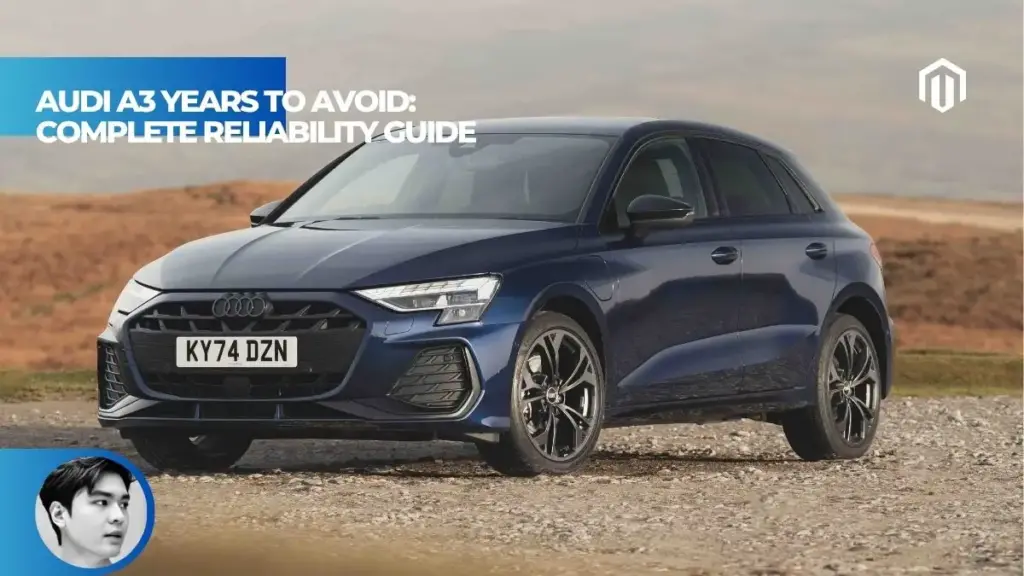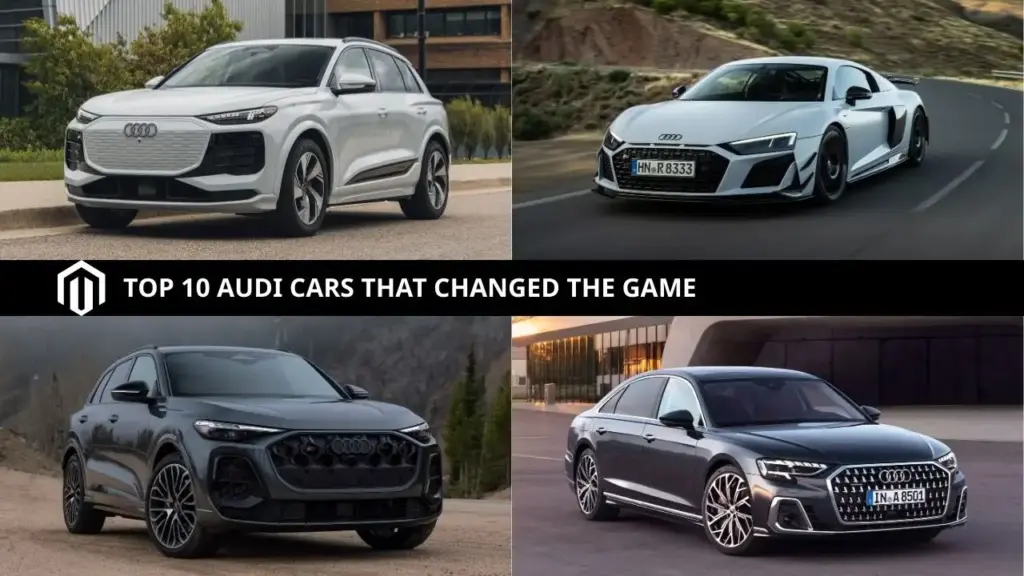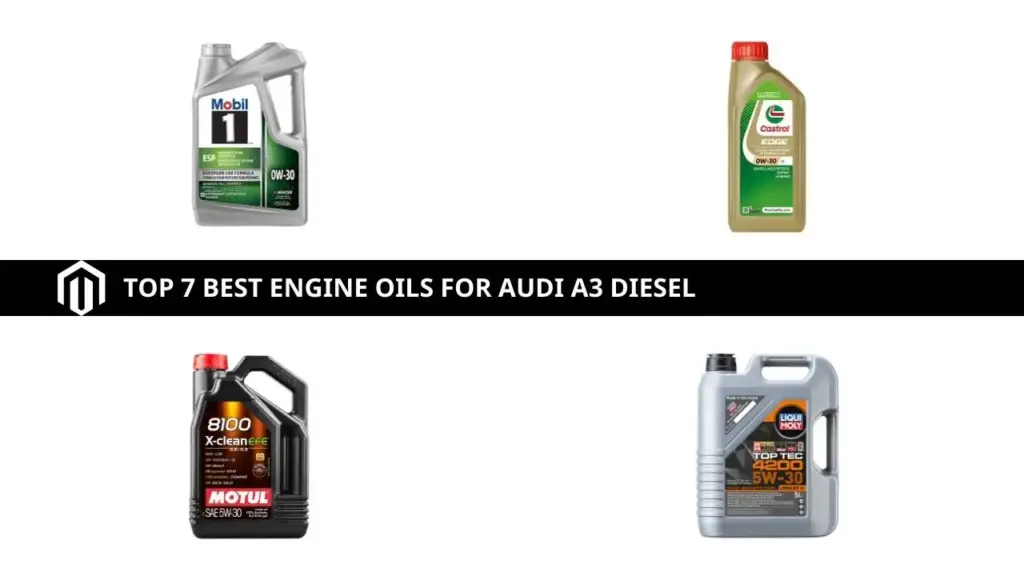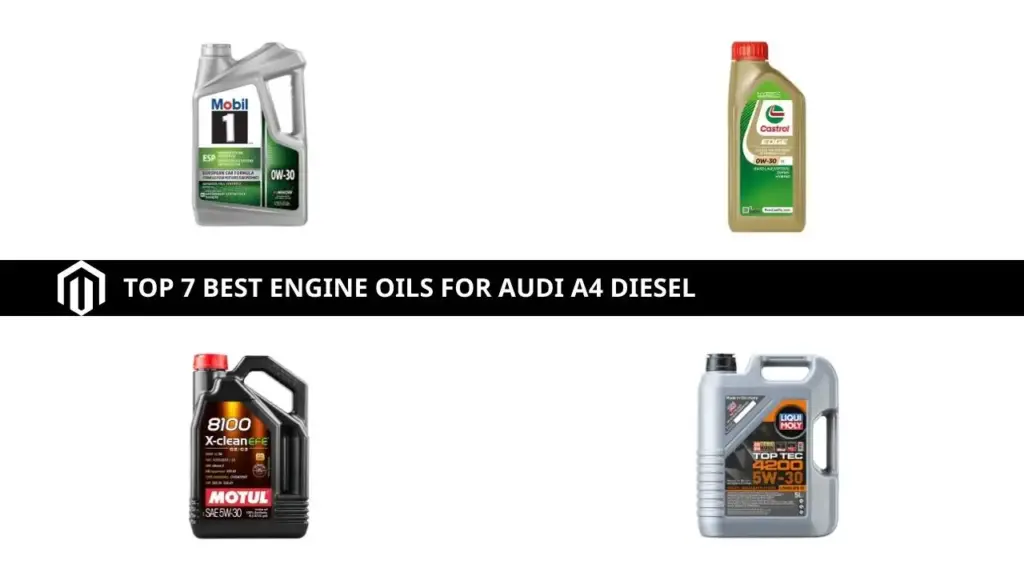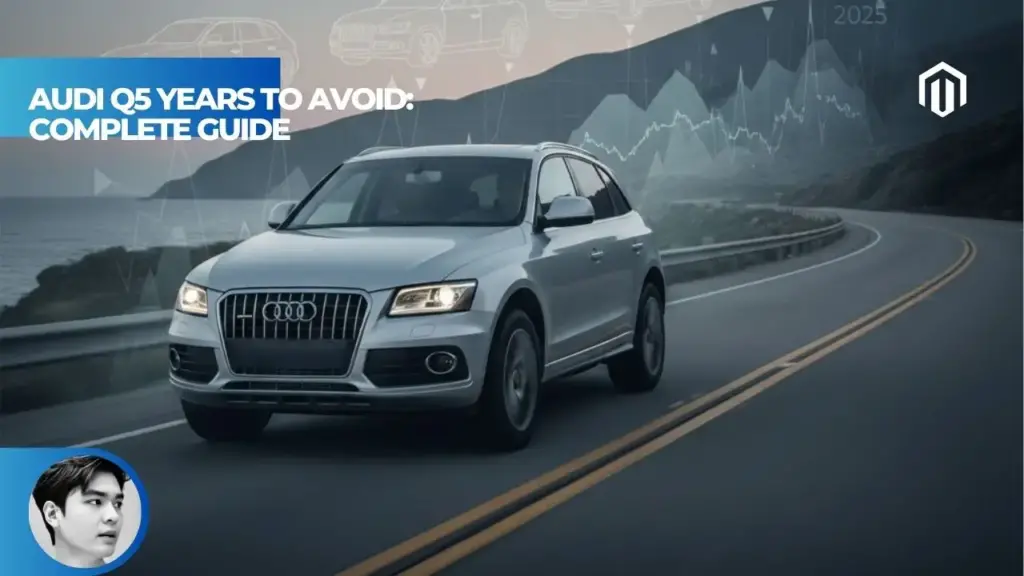You may also like:
Avoid the 2006-2009, 2012, 2015, and 2016 Audi A3 model years. The 2015 A3 ranks as the worst overall due to excessive oil consumption costing $3,200 to repair at just 37,000 miles[1]. Earlier models (2006-2012) suffer from expensive DSG transmission failures that can cost $2,000-$5,000 to fix[2]. If you’re shopping for a used A3, target the 2017-2020 or 2022+ model years for the fewest headaches.
Audi A3 Years to Avoid: Complete List
| Model Year | Generation | Primary Problems | Avg Repair Cost | Avoid Rating |
|---|---|---|---|---|
| 2015 | 8V (3rd) | Oil consumption, sudden power loss | $3,200-$7,200[1] | Worst |
| 2006 | 8P (2nd) | DSG failure, HPFP problems | $2,000-$5,000[2] | Very Bad |
| 2016 | 8V (3rd) | Electrical issues, infotainment | $741/year[3] | Bad |
| 2007-2009 | 8P (2nd) | DSG transmission, timing chain | $2,500-$4,000[2] | Bad |
| 2012 | 8P (2nd) | DSG issues, electrical faults | $2,000-$3,000[4] | Moderate |
| 2018 | 8V (3rd) | Recalls, suspension rattles | $746/year[3] | Moderate |
The complaint numbers represent only the tip of the iceberg. What matters most is the severity and cost of repairs—and certain A3 years hit owners’ wallets particularly hard.
2015 Audi A3: The Worst Year to Buy
The 2015 A3 earned CarComplaints’ designation as the worst model year in A3 history[1]. Being the first full year of the third-generation (8V) platform, early adopters paid the price for production bugs.
Excessive Oil Consumption
The 2015 A3’s 2.0-liter TFSI engine burns oil at alarming rates. Owners report adding oil every 1,000-2,000 miles under normal driving conditions. The average repair cost hits $3,200 at just 37,000 miles[1]. That’s potential engine damage territory well before most owners finish paying off their car loans.
Engine Dying While Driving
Even more alarming: multiple reports of the engine dying while driving, with average repair costs of $7,200 at just 26,000 miles[1]. Imagine cruising at highway speed when your car suddenly loses power. This isn’t a minor inconvenience—it’s a safety hazard.
The transmission warning light issue compounds the problems, averaging $5,000 to fix at 25,000 miles[1]. Combined with electrical gremlins, the 2015 A3 represents the worst value proposition in the model’s history.
If you’re also considering the larger 2024 Audi A4 or 2025 Audi A4, the fourth-generation A3 shares much improved engineering.
2006-2009: The DSG Disaster Years
The second-generation 8P Audi A3 (2006-2013) launched in the US market with Audi’s DSG (Direct-Shift Gearbox) automatic transmission. The catch? These early units were plagued with mechatronic failures[2].
What Went Wrong
The DSG’s mechatronic unit—the electronic brain controlling clutch engagement and gear selection—fails prematurely. Symptoms include jerky shifts, hesitation, sudden loss of power, and eventual complete transmission failure. Repair costs range from $2,000 for clutch replacements to $5,000+ for full mechatronic unit rebuilds[5].
According to WhatCar?, 15% of A3 owners from 2003-2013 experienced gearbox issues[4]. That’s nearly one in six vehicles—far too high for a premium brand.
High-Pressure Fuel Pump (HPFP) Failures
The 2006-2009 models also suffered from high-pressure fuel pump failures on the 2.0T engine[2]. When the HPFP fails, metal shavings can contaminate the entire fuel system, turning a $500 pump replacement into a $3,000+ fuel system overhaul. This issue affected many VW/Audi 2.0T engines from this era.
For diesel buyers, the 2004-2008 2.0 TDI models experienced oil pump drive failures and fuel pipe cracking from engine vibration[6]. Both issues can cause catastrophic damage if not caught early.
2016 Audi A3: Continued Growing Pains
The 2016 A3 inherited many 2015 problems while adding some new ones. CoPilot lists it among the years to avoid due to elevated complaint rates[7].
Infotainment and Electrical Issues
The 2016 model’s main complaints center on in-car electronics. The MMI infotainment system, camera/sensors, and rear entertainment systems all generated owner frustration[3]. Engine issues requiring rebuilding or replacement also surfaced, following the pattern established by the 2015 model.
Annual maintenance costs average $746 with average repair costs of $741[3]. While not catastrophic, these figures exceed competitors like the BMW 2 Series Gran Coupe or Mercedes A-Class.
RepairPal gives both 2015 and 2016 models a 3.5/5 reliability rating—acceptable but below the premium standard buyers expect[3].
2012: End of Generation Issues
The 2012 A3 represents the final years of the 8P generation but still carries significant DSG transmission concerns[4].
This model year sits in the problematic 2012-2015 window that multiple sources identify for DSG problems and electrical faults[6]. While complaint volumes are lower than 2006 or 2015, the underlying mechanical issues remain expensive to address. Mechatronic repairs can exceed the vehicle’s value on these older models[2].
If shopping for this era, strongly consider manual transmission examples. Most warranty claims were for automatic gearbox-related issues[6].
Carbon Buildup: A Problem Across Multiple Years
Like its Audi A4 sibling, the A3’s 2.0-liter TFSI direct-injection engine suffers from carbon buildup on intake valves. This issue spans multiple generations[8].
Why It Happens
Direct injection sprays fuel directly into the combustion chamber rather than onto the intake valves. Without fuel washing the valves clean, carbon deposits accumulate over time. Symptoms typically appear between 60,000 and 80,000 miles and include rough idling, hesitation, and reduced fuel economy.
When evaluating how many miles is good for a used car, the 60-80k mile range becomes critical for TFSI-equipped A3s. Ask for service records showing walnut blasting or chemical cleaning of intake valves—or budget $400-$800 for this service.
Audi A3 Best Years to Buy Instead
Not every A3 deserves suspicion. Several model years earned strong reliability scores and minimal complaints.
| Model Year | Generation | J.D. Power Score | Why It’s Good |
|---|---|---|---|
| 2019 | 8V (3rd) | 91%[9] | Advanced tech, refined powertrain |
| 2020 | 8V (3rd) | 4.8/5 reliability[9] | Perfect CarComplaints score |
| 2017 | 8V (3rd) | 88.5%[9] | First fully reliable 8V year |
| 2022+ | 8Y (4th) | 4/5 predicted[10] | Latest tech, improved reliability |
| 2013 | 8P (2nd) | 3.5/5[7] | Final 8P, most refined |
The 2017-2020 models represent the sweet spot for used A3 buyers. These facelifted third-generation cars benefit from improved EA888 Gen 3 engines and refined S-tronic transmissions with updated mechatronic units[2]. RepairPal data shows 2017+ models achieving 88.5% reliability scores—significantly improved from earlier years[9].
The 2025 Audi A3 and 2026 Audi A3 continue this reliability trend with the fourth-generation platform.
How to Inspect a Used Audi A3
Even good model years can hide problems. Before buying any used A3:
- Check oil level and condition — Pull the dipstick before and after test driving. Significant drop indicates consumption issues
- Test the DSG transmission thoroughly — During the test drive, accelerate from stops and monitor for jerky shifts, hesitation, or warning lights
- Listen for timing chain rattle — Cold starts that produce brief rattling indicate worn tensioners
- Scan for codes — Request a diagnostic scan even without warning lights present
- Verify maintenance records — Confirm DSG fluid changes (every 40,000 miles) and oil changes (every 5,000-7,500 miles)
For 8P-generation cars (2006-2013), specifically ask about mechatronic unit repairs—this single component can cost more than the car is worth on older examples[2].
Key Takeaways
- Avoid the 2015 A3 at all costs—excessive oil consumption, transmission failures, and engine death issues cost $3,200-$7,200 at low mileage[1]
- Skip 2006-2009 and 2012 models due to DSG mechatronic failures costing $2,000-$5,000 to repair[2][5]
- Be cautious with 2016 as first-year problems continued from 2015 with electrical and infotainment issues[7]
- Best bets are 2017-2020 and 2022+ for the highest reliability scores and lowest complaint volumes[9]
- Consider manual transmission on older models to avoid expensive DSG repairs entirely[6]
- Budget $3,000-$5,000 for potential repairs if buying problematic years despite attractive pricing[2]
FAQs
What is the worst year for the Audi A3?
The 2015 Audi A3 is the worst model year according to CarComplaints.com[1]. Excessive oil consumption averaging $3,200 to repair at just 37,000 miles, transmission warning lights costing $5,000 at 25,000 miles, and engine failures reaching $7,200 make this year particularly expensive to own[1]. CoPilot also identifies 2015 as the worst A3 year due to the concentration of engine-related problems[7].
Which Audi A3 generation is most reliable?
The facelifted third generation (2017-2020) represents peak A3 reliability. These years benefit from improved EA888 Gen 3 engines and refined S-tronic transmissions with updated mechatronic units[2]. J.D. Power gives the 2019 A3 a 91% dependability rating, and CarComplaints shows minimal issues for 2017-2020 models[9]. The fourth generation (2022+) also shows strong initial reliability.
Do all Audi A3s have transmission problems?
No. The DSG transmission issues primarily affect 2006-2013 second-generation (8P) models[4]. According to WhatCar?, about 15% of A3 owners from 2003-2013 experienced gearbox issues[4]. The revised S-tronic transmissions in 2017+ models show dramatically improved reliability. Manual transmission A3s from any year avoid these issues entirely.
How long does an Audi A3 typically last?
A well-maintained Audi A3 can last between 150,000 and 200,000 miles, with some owners reporting even higher mileage[8]. The key is consistent maintenance including timely oil changes, DSG fluid services (automatic models), timing belt replacements, and addressing issues early. Choosing reliable model years (2017-2020) significantly increases the likelihood of reaching high mileage without major repairs.
Is the Audi A3 expensive to maintain?
The Audi A3 averages $709-$746 in annual maintenance costs according to RepairPal[3]. This ranks slightly higher than the compact luxury average but lower than many German competitors. Problem years like 2015 can dramatically increase costs with major repairs exceeding $7,000[1]. Choosing reliable years (2017+) and following maintenance schedules keeps ownership costs reasonable.
References
- CarComplaints.com. (2024). Audi A3 Problems. https://www.carcomplaints.com/Audi/A3/
- Autvex. (2025). Audi A3 Years to Avoid (And the Best Years to Buy). https://autvex.com/audi-a3-years-to-avoid/
- YouTube – Simple Mechanic Advice. (2025). Audi A3 Years To Avoid: What Model Year Is The Least Reliable.
- WhoCanFixMyCar. (2025). Audi A3 Problems | Common Faults & Repair Costs. https://www.whocanfixmycar.com/advice/audi-a3-common-problems
- WhatCar?. (2019). Will my automatic Audi A3 suffer gearbox problems? https://www.whatcar.com/advice/buying/will-my-automatic-audi-a3-suffer-gearbox-problems/n19951
- Bumper. (2025). Audi A3 Common Problems (& How to Fix Them). https://www.bumper.co/blog/audi-a3-problems
- CoPilot. (2024). The Audi A3 Years To Avoid. https://www.copilotsearch.com/posts/audi-a3-years-to-avoid/
- Capital Motor Cars. (2025). Audi A3 Reliability Guide. https://capitalmotorcars.com/audi-a3-reliability-guide/
- Cars Counsel. (2025). Best and Worst Audi A3 Years: What to Buy & Avoid. https://carscounsel.com/audi-a3-best-worst-years/
- Consumer Reports. (2023). 2018 Audi A3 Reliability. https://www.consumerreports.org/cars/audi/a3/2018/reliability/

I am a senior automotive analyst at Autvex. Expert vehicle evaluations, in-depth reviews, and objective analysis helping readers make informed automotive decisions with years of industry experience.

